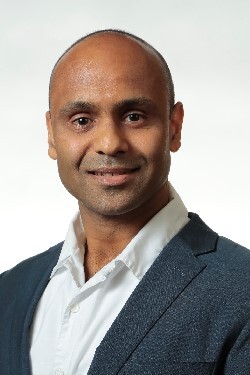Main Second Level Navigation
- Welcome
- Why Toronto?
- History of the Department
- Vision & Strategic Priorities
- Our Leadership
- Our Support Staff
- Location & Contact
- Departmental Committees
- Department of Medicine Prizes & Awards
- Department of Medicine Resident Awards
- Department of Medicine: Self-Study Report (2013 - 2018)
- Department of Medicine: Self-Study Report (2018 - 2023)
- Communication Resources
- News
- Events
Disrupting assumptions about diabetes

Haley Lewis
Republished from November 2020 UofTMed Magazine: The Insulin Issue
Professor Satya Dash (PGME ’13) has heard the stereotypes many times: Type 2 diabetes is due solely to poor diet and lack of exercise. Or: With stronger willpower, patients will lose weight and their diabetes will improve.
But for Dash, understanding diabetes means looking beyond a person’s behaviour and habits.
His work centres the disease on genetics, and is disrupting public stereotypes and assumptions around how people develop type 2 diabetes.
“In the general population, most people will become insulin resistant as a result of weight gain, but the threshold at which it happens will vary from person to person,” he says. “And that threshold is, to a large extent, determined genetically.”
Dash’s research focuses on finding the genetic factors that make people prone to obesity and insulin resistance, which then affect their likelihood of developing type 2 or high blood glucose levels.
“There can be different conditions that lead to high blood glucose”
“There can be different conditions that lead to high blood glucose, such as if a person is insulin resistant, if they don’t make enough insulin or a combination of the two,” he explains.
Dash completed his clinical training and a PhD in the genetics of insulin resistance at the University of Cambridge.
In 2011, he came to the University of Toronto to join the Banting & Best Diabetes Centre and complete a four-year postdoctoral fellowship in Professor Gary Lewis’ lab.
Dash pursued this fellowship because he was interested in learning more about how the gut produces fat, a complex process regulated by diet and various hormones, and in better understanding metabolic disease.
It’s a theme that has persisted in Dash’s work.
“Today, I’m still working to try to use genetics to better understand the different ways in which one can develop type 2 diabetes with weight gain, and whether this impacts how a patient responds to treatment,” he says. “This is important because it can potentially lead to more individualized treatment plans for patients.”
Part of tackling the public health crisis posed by the accelerating number of Canadians with type 2 is investigating the cause of the increase.
“There are definitely social components to whether someone develops type 2 diabetes. Our genes have not changed,” he says.
“The major challenge facing researchers like me is to try and understand what exactly predisposes people to develop type 2 diabetes. And then our job is to discern what the best treatment is.”
Part of the solution might mean suggesting that more patients explore bariatric surgery.
“Bariatric surgery is the most effective treatment for sustained weight loss, and it can actually cure type 2 diabetes in many people,” he says. “But if you look at the number of people in Canada who can potentially access bariatric surgery versus the number who actually have the procedure, there’s a large discrepancy.”
Dash notes that there is research indicating that there’s a stigma about people who choose to lose weight through bariatric surgery.
“It’s thought of as taking the easy way out,” he says. “That attitude contributes to people not having surgery. We need more progressive attitudes and a change in our approach.”
Satya Dash is an assistant professor with the Temerty Faculty of Medicine’s Department of Medicine and a staff physician in the division of endocrinology at Toronto General Hospital. He is also the medical director of the bariatric program at University Health Network.

